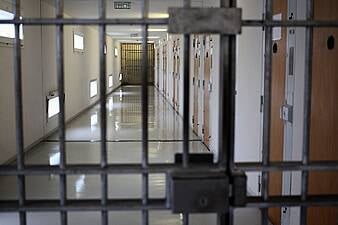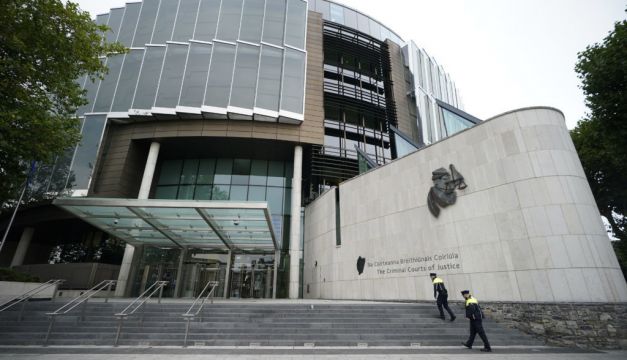A man who was jailed for sexually assaulting an asylum seeker he claimed he had just married in a Muslim ceremony has had his conviction quashed by the Court of Appeal after new evidence came to light about her sexual experience.
After his conviction was quashed on Monday, the man began to cry and asked: "Can I go home now?"
The Court of Appeal ordered that a retrial take place and remanded the accused man in custody until June 7th, with consent to bail.
The man's legal team successfully argued that his conviction was unsafe after updated phone software allowed gardaí to extract new material regarding the woman's sexual knowledge or experience.
The woman had claimed to never having had sex by the time of the ceremony and had no knowledge of sexual intercourse.
The man (55), who cannot be named for legal reasons, had pleaded not guilty to a sexual assault alleged to have occurred on December 1st, 2017, in Co Dublin.
In April 2021, the appellant was tried and found guilty before a jury at the Central Criminal Court before being jailed for five and a half years.
It has been the State's case that the man had participated in the ceremony at a mosque in Dublin after which the complainant alleged that the appellant hugged her, touched her on her breasts and buttocks and pushed her towards his bedroom.
Arranged marriage
The trial heard that during a visit to Ireland in November 2017, the woman sought asylum to avoid an arranged marriage in her native country.
She later made contact with a Muslim centre who arranged for a meeting between her and the accused man after the woman said she would be interested in meeting a man of the same faith to marry.
The investigating garda told the trial that some class of ceremony was later performed between the accused and the woman. The garda agreed that there was “disagreement as to the significance” of the ceremony and the trial was told it was “a precursor to marriage but not marriage itself”.
In February 2022, gardaí informed the appellant's legal team that an analysis of the complainant's phone revealed additional information that was not possible to retrieve in 2018 when the investigation was in progress.
At the Court of Appeal on Monday, Ms Justice Isobel Kennedy said the complainant gave evidence at the trial that she had never had sexual intercourse and that she knew nothing of sexual matters.
Ms Justice Kennedy said the trawl of the phone revealed that the woman had searched for 'hot kisses and sex' in October and November 2017 and had searched whether it was normal to bleed when the hymen was ripped.
The woman also queried whether oral sex caused Aids, the solution for vomiting during pregnancy, whether sperm can be transmitted by hand-touch or through clothing, and how sperm is transmitted to the egg.
Further searches related to the effect of diabetes on an erection, whether pregnancy can occur directly after a period, and a query on what was pre-ejaculate fluid.
Credibility
The man's legal team had submitted that the information was relevant to the complainant's credibility where she had maintained she was a virgin before she met the appellant and knew nothing of sexual matters.
The man told gardaí in an interview that the woman first told him that she was a virgin but that she also had difficulties having sex in the past.
"This, it appears to us, is the height of the appellant's contention, that while the complainant said she was a virgin, she also said, according to the appellant, that she had sexual difficulties previously," Ms Justice Kennedy said.
"This new material, it is said, would have served to assist the defence in attacking her credibility on this issue, demonstrating she had sexual experience," the judge said.
Ms Justice Kennedy said none of the searches "point directly to sexual intercourse, but are indicative of a curiosity regarding sexual issues".
The judge said there were "concerning coincidences" regarding the times of the searches, which were made when the woman was staying with a friend in Ireland. Lawyers for the man previously told the appeal court that some of these searches coincided with a March 2017 visit to Ireland when she stayed with a male friend.
Ms Justice Kennedy said the new data could not be taken "in isolation", in circumstances where the appellant contends that the information could support his claim that the woman found out that she would not be allowed to stay in this jurisdiction based on the Nikah marriage ceremony alone.
The defence contended that once the woman found out the ceremony would not provide her with that protection she made a false complaint.
The judge said that had the material been available at the trial the defence could have been granted an application to cross-examine the woman on her prior sexual experience.
"We believe that the fresh material could have had an important influence on the outcome of the trial. Given that the evidence could have had an impact on the jury's verdict, we will quash the conviction," Ms Justice Kennedy said.
Ms Justice Kennedy said the court would order that a retrial could take place and adjourned the matter to the first day of the next legal term for instructions from the Director of Public Prosecutions.
Trial
At the trial, the man had pleaded not guilty to three counts of rape, one of sexual assault and one of attempted rape of the woman in his Dublin home on various occasions over the weekend of December 1st to December 3rd, 2017.
The jury told trial judge Mr Justice Alex Owens that following eight and half hours of deliberation on the tenth day of the trial, they could reach a majority verdict on one count of sexual assault, but they were deadlocked in relation to the other four counts.
In a July 2021 sentence hearing, Mr Justice Owens had imposed a sentence of six years and suspended the final six months on condition that the man keep the peace and be of good behaviour for those six months.
Mr Justice Owens had also imposed a four-year post release supervision order after he commented that he thought that the man would still be “capable of committing sexual offences on his release from prison”.
The trial heard that, after the ceremony, the accused and the woman went back to his flat, with the man claiming she was his wife and the woman saying she was not his wife.
It was the State's case that the accused attempted to hug the woman but she pushed him away as he started to try and pull her into his bedroom. She continued to try and push him away as he continued to touch her.
It was alleged that the woman asked him to stop but the man managed to get her into the bedroom where he directed her to take her clothes off. The State argued that the woman was crying and he then asked why she wouldn’t take her clothes off to which she replied that she didn’t want to.
She later reported the man to gardaí, and he was arrested in May 2018. He claimed that they had consensual sexual activity which terminated because of his inability to get an erection.
The court heard that the man takes care of his 14-year-old daughter who lives with him.
Hugh Hartnett SC, defending, said a psychological report concluded that the case has had a significant psychological impact on his client and had "troubled him greatly”.
Mr Hartnett had submitted that his client is “a hard-working man who took his duties as a father very seriously”.

He said that many testimonials were submitted to the court on behalf of his client which outlined the work he does for a homeless charity.
"He has an unblemished previous character and is also a man who did significant good in donating both money and time to those who were less fortunate than he,” Mr Hartnett said.
If you have been affected by any of the issues raised in this article, you can call the national 24-hour Rape Crisis Helpline at 1800-77 8888, access text service and webchat options at drcc.ie/services/helpline/, or visit Rape Crisis Help.
In the case of an emergency, always dial 999/112.







